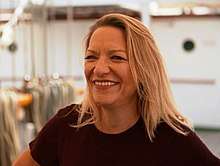Antje Boetius
Antje Boetius (born 5 March 1967) is a German marine biologist presently serving as professor of geomicrobiology at the Max Planck Institute for Marine Microbiology, University of Bremen.[1] She received the Gottfried Wilhelm Leibniz Prize, with 2.5 million euros in funding, in March 2009 for her study of sea bed microorganisms that affect the global climate.[2] She was the first person to describe anaerobic oxidation of methane,[2] and believes the Earth's earliest life forms may have subsisted on methane in the absence of molecular oxygen (instead reducing oxygen-containing compounds such as nitrate or sulfate).[3] She has also suggested such life forms may be able to reduce the rate of climate change in future.[3] She is one the laureate of the 2018 Environment Prize (German Environment Foundation)[4]
Antje Boetius | |
|---|---|
 | |
| Born | 5 March 1967 Frankfurt am Main, Germany |
| Alma mater | University of Hamburg |
| Awards | Gottfried Wilhelm Leibniz Prize Gustav-Steinmann-Medaille (2014) |
| Scientific career | |
| Fields | Marine biology |
| Institutions | University of Bremen |
Career
Boetius received her biology degree from the University of Hamburg in 1992,[5] her doctorate in biology from the University of Bremen in 1996,[5] became an Assistant Professor in 2001[5] and an Associate Professor in 2003.[5] Her research interests are in the marine methane cycle, the ecology of chemosynthetic habitats, microbial processes of early diagenesis in deep-sea sediments, pressure and temperature effects on microbial processes, microbial symbiosis, geomicrobiology and the global carbon cycle.[1][5] In addition to her current role as Professor of Geomicrobiology, which she has held since March 2009,[6] she is also leader of the HGF-MPG Bridge Group on Deep Sea Ecology and Technology[6] and leader of the "Microbial Habitat Group" that researches biogeochemistry, transport processes and microbial processes in benthic environments.[6]
Boetius was elected for an initial first term of office in the DFG Senate in 2015.
Other activities
- Jacobs University Bremen, Member of the Board of Governors (since 2018)
- German Research Foundation (DFG), Member of the Senate
- Leibniz Association, Member of the Senate
- Natural History Museum, Berlin, Member of the Scientific Advisory Board
- Senckenberg Nature Research Society, Member of the Scientific Advisory Board[7]
- American Geophysical Union (AGU), Member
- American Society for Microbiology (ASM), Member
Personal life
Mission Medico describe her interests as "La bonne cuisine, le bon vin, la bonne compagnie, la bonne musique, la mode et la vie citadine" ((in French) "Good food, good wine, good company, good music, fashion and city life").[8]
References
- Antje Boetius, profile at the University of Bremen webpage, retrieved 28 May 2010.
- 2009 Leibniz prizewinners, Eurekalert, retrieved 28 May 2010.
- Methane-Eating Life Form May Halt Global Warming, The Guardian, published 9 August 2002, retrieved 28 May 2010.
- "German Environmental Prize goes to Marine Biologist Boetius and Leipzig Waste Water Experts". www.dbu.de. Retrieved 2018-10-29.
- Antje Boetius, profile at Jacobs University webpage, retrieved 28 May 2010.
- Antje Boetius Archived 2011-07-19 at the Wayback Machine, curriculum vitae at the University of Bremen, retrieved 28 May 2010.
- Scientific Advisory Board Archived 2018-09-19 at the Wayback Machine Senckenberg Nature Research Society.
- Boetius, (in French) Mission Medico, retrieved 28 May 2010.